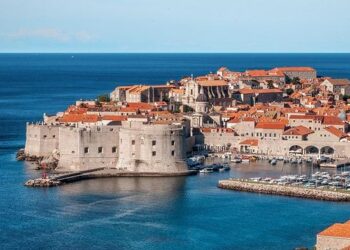A consortium led by Minesto has secured $2.6 million in funding to develop an innovative tidal microgrid project in the Faroe Islands, marking a significant step forward in harnessing marine renewable energy. The initiative aims to integrate Minesto’s cutting-edge tidal energy technology into the local power grid, enhancing the archipelago’s energy resilience and sustainability. This investment underscores growing interest in tidal power as a reliable clean energy source and highlights the Faroe Islands’ commitment to reducing carbon emissions through innovative offshore solutions.
Minesto-Led Consortium Secures Funding to Advance Tidal Microgrid Project in Faroe Islands
The consortium led by Minesto has successfully secured $2.6 million in funding, aimed at progressing an innovative tidal microgrid project in the Faroe Islands. This initiative seeks to harness the region’s abundant tidal energy resources to deliver reliable, sustainable power to remote communities traditionally dependent on fossil fuels. With an emphasis on cutting-edge marine energy technology, the project aims to demonstrate how small-scale, decentralized tidal energy systems can contribute to energy security while reducing carbon emissions in island settings.
The funded project will focus on several key objectives, including the deployment of Minesto’s proprietary Deep Green tidal energy technology alongside advanced microgrid solutions tailored for island environments. The collaboration involves stakeholders from the energy, technology, and local government sectors, all working toward a shared goal of clean energy integration. Key project highlights include:
- Installation of tidal energy converters: Leveraging deep-sea currents for consistent power generation
- Microgrid development: Enhancing energy resilience and grid stability in isolated areas
- Environmental monitoring: Ensuring minimal ecological impact through continuous assessment
- Community engagement: Supporting local needs and promoting clean energy adoption
| Component | Specification | Expected Impact |
|---|---|---|
| Deep Green Tidal Units | 2 MW capacity per unit | Reliable, renewable energy supply |
| Microgrid Infrastructure | Smart control systems | Improved power stability |
| Environmental Sensors | Real-time data collection | Reduced ecological footprint |
Innovative Offshore Energy Solution Targets Remote Community Electrification and Sustainability
The consortium spearheaded by Minesto has secured $2.6 million in funding to develop an innovative tidal microgrid system tailored for the Faroe Islands’ remote communities. This pioneering project aims to harness the region’s strong tidal currents using Minesto’s unique Deep Green technology, which converts undersea tidal flows into reliable renewable electricity with minimal environmental impact. By integrating a microgrid approach, the initiative enables local energy autonomy, reducing dependence on imported fossil fuels and enhancing grid resilience in off-grid settlements scattered across rugged island terrains.
Key features of the microgrid solution include:
- Scalable energy output: Optimized for varying tidal strengths to meet local demand
- Modular design: Easy integration with existing infrastructure and future expansions
- Environmental monitoring: Real-time data collection to ensure ecosystem preservation
- Community empowerment: Enhanced energy security promoting sustainable livelihoods
| Parameter | Value | Impact |
|---|---|---|
| Installed Capacity | 150 kW | Powering 40 households |
| Operational Depth | 15-30 meters | Optimal tidal current capture |
| CO‚āā Emission Reduction | Approx. 300 tons/year | Lower carbon footprint |
| Projected Commissioning | Q3 2025 | Full microgrid integration |
Experts Recommend Scaling Microgrid Deployment to Boost Renewable Integration in Isolated Regions
The recent funding boost of $2.6 million to the Minesto-led consortium underscores a growing consensus among energy experts on the critical role microgrids play in integrating renewable energy sources within isolated regions. By leveraging tidal energy technology, the project in the Faroe Islands serves as a pioneering model for how localized grids can stabilize power supply while reducing reliance on imported fossil fuels. Industry analysts highlight that microgrids, particularly those harnessing marine renewables, offer a scalable and resilient solution to energy challenges faced by remote island communities. Such deployments not only enhance energy security but also significantly cut carbon emissions, aligning with global decarbonization targets.
Key benefits of expanding microgrid infrastructure in similar regions include:
- Enhanced grid stability through diversified energy inputs
- Increased renewable penetration thanks to tailored, small-scale solutions
- Local economic development via job creation in clean-tech sectors
- Reduced operational costs by minimizing fuel imports and transmission losses
| Aspect | Traditional Grid | Microgrid (Tidal-based) |
|---|---|---|
| Energy Source | Imported fossil fuels | Locally harnessed tidal energy |
| Resilience | Vulnerable to outages | Highly reliable and adaptive |
| Carbon Emissions | High | Minimal to none |
| Operational Costs | Elevated by transport/logistics | Reduced through local generation |
Future Outlook
As the Minesto-led consortium moves forward with the tidal microgrid project in the Faroe Islands, this $2.6 million funding injection underscores a growing commitment to innovative renewable energy solutions in offshore environments. The initiative not only promises to enhance energy security for the remote archipelago but also serves as a potential blueprint for sustainable microgrid systems in similar coastal communities worldwide. Stakeholders and industry observers alike will be watching closely as the project progresses toward operational deployment in the coming months.













